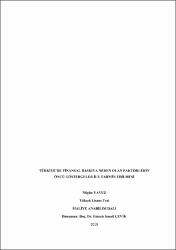| dc.contributor.author | Yavuz, Nilgün | |
| dc.date.accessioned | 2020-02-04T12:34:56Z | |
| dc.date.available | 2020-02-04T12:34:56Z | |
| dc.date.issued | 2019 | |
| dc.identifier.uri | https://hdl.handle.net/20.500.11776/3564 | |
| dc.description.abstract | Özellikle 1990’ların başından itibaren finansal krizlerin nedenlerini araştıran çalışmaların sayısında önemli bir artış gerçekleşmiştir. Bu nedenle, literatürde finansal krize neden olan faktörleri belirlemek için çeşitli modeller bulunmaktadır. Finansal krizin kaynaklarını belirlemek önemlidir çünkü bu politika yapıcılara önceden önlem almaları için rehberlik edecektir. Diğer taraftan, küresel finansal krizden sonra finansal stresin ölçülmesi önem kazanmıştır, çünkü küresel finansal krizin en önemli nedenlerinden biri, tüm ekonomideki finansal stresin artmasıdır. Bu nedenle, finansal stresin ölçülmesi ve izlenmesi politika yapıcılar için çeşitli faydalar sağlayabilir. Bu çalışmanın amacı, Türkiye’deki finansal stresi ölçmek için bir finansal stres endeksi oluşturmaktır. Finansal stres endeksi oluşturulurken; para piyasası, sermaye piyasası, ülke riski, dış borç ve enflasyon gibi finansal baskıya neden olabilecek birçok faktör göz önünde bulundurulmuştur. Finansal baskı endeksini hesaplamada temel bileşenler analizi kullanılmıştır. Ampirik sonuçlar, finansal stres endeksinin Türkiye’deki tüm daralma dönemlerini başarılı bir şekilde yakaladığını göstermektedir. Son olarak, Türkiye’deki finansal stresi etkileyebilecek küresel faktörler ARDL modeli ile araştırılmıştır. Analiz sonuçları, VIX, S&P 500 endeksinin, dünyadaki enflasyonun ve ekonomik büyümenin Türkiye'deki finansal stresi önemli derecede etkilediğini göstermektedir. | en_US |
| dc.description.abstract | It is well known that there has been an increasing literature that focus on examine the sources of financial crises specifically after the beginning of the 1990’s. Therefore, there have been several models in the literature to determine the factors that cause to financial crisis. In order to determine the sources of financial crisis is important because it will provide guidance for policy makers to take prevent in advance. On the other hand, after the global financial crisis the measuring of financial stress becomes important because the one of the most important factors of the global financial crisis is the raising financial stress in the whole economy. Therefore, measuring and monitoring financial stress can provide several benefits for the policy makers. The aim of the study is to construct a financial stress index to gauge a financial stress in Turkey. We consider several aspects of the financial stress in Turkey such as money market, stock exchange market, country risk, external debt and inflation. The principal component analysis is employed to calculate financial stress index. Empirical results show that financial stress index tracks successfully all recessions in Turkey. Finally, we also examine global factors that may affect financial stress in Turkey by means of ARDL model. Analysis results suggest that VIX, S&P 500 index, inflation and economic growth in the world significantly effect the financial stress in Turkey | en_US |
| dc.language.iso | tur | en_US |
| dc.publisher | Namık Kemal Üniversitesi | en_US |
| dc.rights | info:eu-repo/semantics/openAccess | en_US |
| dc.subject | Finansal Baskı | en_US |
| dc.subject | Finansal Baskı Endeksi | en_US |
| dc.subject | Finansal Kriz | en_US |
| dc.subject | Financial Stress | en_US |
| dc.subject | Financial Stress Index | en_US |
| dc.subject | Financial Crises | en_US |
| dc.title | Türkiye’ de finansal baskıya neden olan faktörlerin öncü göstergeler ile tahmin edilmesi | en_US |
| dc.title.alternative | The Estimation of the Factor that Cause the Financial Stress in Turkey with Leading Indicators | en_US |
| dc.type | masterThesis | en_US |
| dc.department | Enstitüler, Sosyal Bilimler Enstitüsü, Maliye Ana Bilim Dalı | en_US |
| dc.relation.publicationcategory | Tez | en_US |



















